PHC issues detailed judgement: ‘Accused can’t be arrested multiple times in different cases’
Detailed judgment issued by PHC in writ petition filed by NA former speaker Asad Qaiser and former MNA Mujahid Ali Khan
PESHAWAR: The Peshawar High Court (PHC) on Thursday said that a one-time arrest of a citizen would be considered arrest in all the cases registered against an accused during the same period.
This was declared in the detailed judgment issued by PHC) in the writ petition filed by National Assembly former speaker Asad Qaiser and former MNA Mujahid Ali Khan, both affiliated to the Pakistan Tehreek-e-Insaf (PTI).
PHC Chief Justice Muhammad Ibrahim Khan and Justice Ishtiaq Ibrahim had heard the writ filed by the PTI arrested leaders. The verdict was reserved on December 19, last year.
Shabbir Hussain Gigyani Advocate and Barrister Aamirullah Chamkani were appointed to assist the court.
Shabbir Hussain Gigyani, the amicus curiae, had told the court that the Constitution was blatantly violated after the May 9 incidents. He had said the police had the authority to make arrests but the force could not be granted unbridled power in this regard. Gigyani contended arresting one accused repeatedly was an illegal practice.
Barrister Aamirullah Chamkani had contended that as per the police rules, the police will have to show the arrest in every case but a time-frame was a legal requirement for that.
The counsels for the PTI had contended in the petition that the police were harassing the party leaders.
They were arrested in another case once they secured bail in one case which, the PTI lawyers had said, was a violation of the basic human rights.
The advocate general had argued that if an accused was wanted in several cases in a police station, his one-time arrest would be considered arrest in all cases.
However, his arrest was a legal requirement if there was a case or cases lodged against him at another police station or by another department, he had argued.
Justice Ishtiaq Ibrahim authored the detailed judgment which spanned 28 pages and was issued the previous day.
It stated the court could intervene to ensure that the constitutional rights whenever freedom and basic rights of a citizen were usurped.
The judgement said the Supreme Court of Pakistan had set the principles in such cases that the arrest of an accused at the same time would be considered the arrest in all the cases registered against him.
The court directed the government to provide the details of registered cases and pending inquiries against the petitioner. The judge directed the PHC registrar to send the judgment to all sessions judges.
-
 Kate Middleton, Prince William Break Silence Over Tragic Shooting In Canada
Kate Middleton, Prince William Break Silence Over Tragic Shooting In Canada -
 'Finding Her Edge' Star Madelyn Keys Explains Adriana's Remarks About Brayden Romance
'Finding Her Edge' Star Madelyn Keys Explains Adriana's Remarks About Brayden Romance -
 Royal Expert Raises Questions Over Sarah Ferguson's 'plotting' Stunning Comeback
Royal Expert Raises Questions Over Sarah Ferguson's 'plotting' Stunning Comeback -
 Instagram Develops AI ‘Create My Likeness’ Tool To Generate Personalised Photos And Videos
Instagram Develops AI ‘Create My Likeness’ Tool To Generate Personalised Photos And Videos -
 Meghan Markle, Prince Harry Friends Suggest Their Marriage 'isn't All It Seems'
Meghan Markle, Prince Harry Friends Suggest Their Marriage 'isn't All It Seems' -
 Andrew Handed Out 'classified' Information To Jeffrey Epstein
Andrew Handed Out 'classified' Information To Jeffrey Epstein -
 Margot Robbie Recalls Wild Party Days And Getting Kicked Out Of Clubs
Margot Robbie Recalls Wild Party Days And Getting Kicked Out Of Clubs -
 NASA's Hubble Space Telescope Discovers ‘Dracula Disk', 40 Times Bigger Than Solar System
NASA's Hubble Space Telescope Discovers ‘Dracula Disk', 40 Times Bigger Than Solar System -
 Annular Solar Eclipse 2026: Where And How To Watch ‘ring Of Fire’
Annular Solar Eclipse 2026: Where And How To Watch ‘ring Of Fire’ -
 Zayn Malik Explains Past Comments About Not Being In Love With Gigi Hadid
Zayn Malik Explains Past Comments About Not Being In Love With Gigi Hadid -
 Internet Reacts To 10 Days Flight Ban Over El Paso
Internet Reacts To 10 Days Flight Ban Over El Paso -
 YouTube Music Tests AI-powered ‘Your Week’ Recap To Summarise Listening Habits
YouTube Music Tests AI-powered ‘Your Week’ Recap To Summarise Listening Habits -
 Kelly Clarkson Ready To Date After Talk Show Exit?
Kelly Clarkson Ready To Date After Talk Show Exit? -
 Is AI Heading Into Dangerous Territory? Experts Warn Of Alarming New Trends
Is AI Heading Into Dangerous Territory? Experts Warn Of Alarming New Trends -
 Google Updates Search Tools To Simplify Removal Of Non-consensual Explicit Images
Google Updates Search Tools To Simplify Removal Of Non-consensual Explicit Images -
 Chilling Details Emerge On Jeffrey Epstein’s Parties: Satanic Rights Were Held & People Died In Rough Intimacy
Chilling Details Emerge On Jeffrey Epstein’s Parties: Satanic Rights Were Held & People Died In Rough Intimacy




